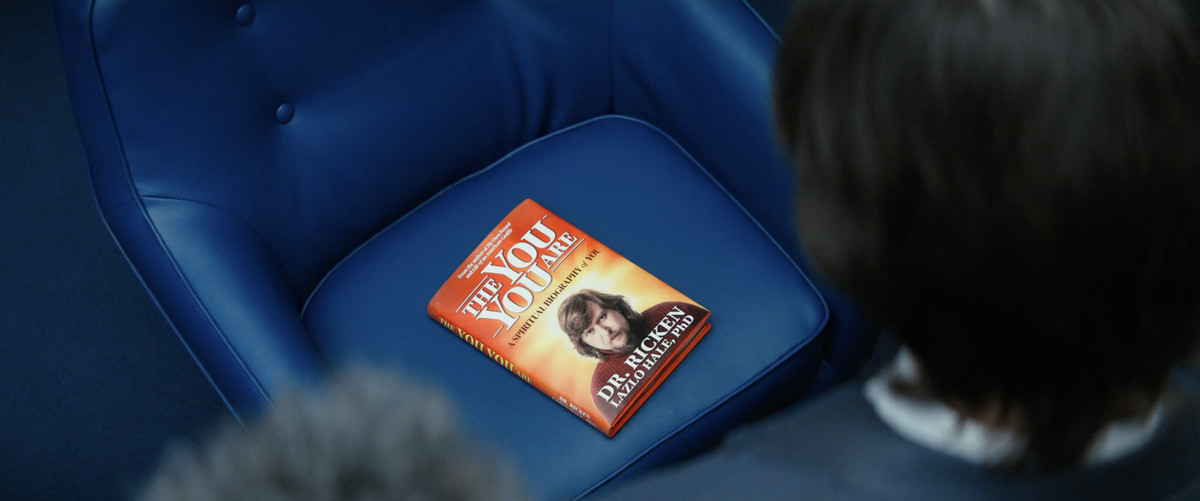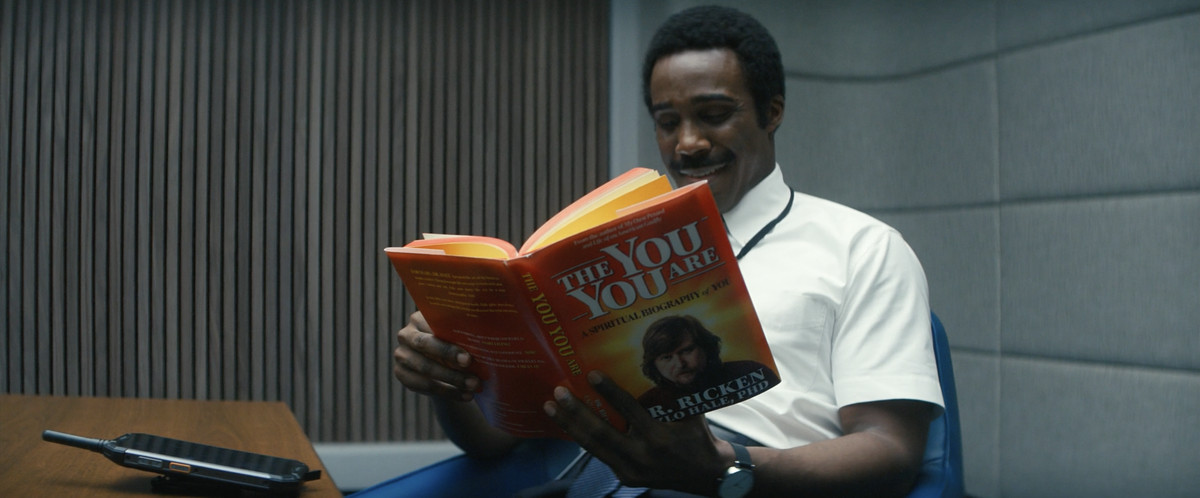It would be easy to dismiss Ricken’s self-help book, The You You Are, in the first season of Severance — it is, in fact, what happens a lot as the copy Ricken (Michael Chernus) leaves on his brother-in-law Mark’s doorstep shuffles from one person to the next. Without even receiving a copy, Mark (Adam Scott) is ready to scoff at Ricken’s attempts to philosophize his way through the world.
But Severance creator Dan Erickson isn’t so sure. To him, the book represented more than a silly joke. And to that end, he never wanted the book to be just a funny voiceover.
“It’s obviously a sort of heightened take on a self-help book,” Erickson tells Polygon in a Zoom interview. “[But] I didn’t want it to be so silly that it felt out of the world. And also with this knowledge that it was going to become a serious plot device later on. So we wanted to write something that, taken out of context, could believably inspire people and had ideas under that bluster that maybe had actual value to them.”
To him, Ricken’s ideas represent an important undercurrent of the show: making the mundane startlingly, stiltedly profound. When Chernus’ buttery voiceover reminds us that “Your so-called boss may own the clock that taunts you from the wall, but, my friends, the hour is yours,” it’s at once corny and provocative. (Erickson’s favorite of Chernus’ delivery is: “Machines are made of metal, but man is made of skin.”)

That delicate balance for a self-help guide set the tone for how Chernus thought of Ricken as a character. The first thing he shot in 2020 was the book cover, which is all flashy, “Dianetics, or like Tony Robbins,” and “vaguely cult-y” with its bright colors. (“Self-help maybe isn’t even right,” he says. “It’s sort of like aggressive help.”)
But the voiceover came later. While the script called for someone to read The You You Are aloud, it wasn’t always clear who that would be. When Chernus finally got tasked with it, he worked hard to dial in to the right balance for Ricken’s tone, calling on his theater and Julliard background to heighten Ricken’s read with a mid-Atlantic accent.
“I know a type, an artistic type, who believes that what they’re doing is the most important thing in the world, and [has] this conviction that the stakes are so high,” Chernus says. “There’s something — of course — pretentious and grandiose about that. But there’s also something incredible about someone just being so dialed in to their vision and their point of view about the world.”
- How to build a website with WordPress and what are the best plugins to use Building a website with WordPress is an excellent choice due to its versatility, ease of use, and a vast array of plugins that enhance functionality. Here’s a comprehensive guide to building a WordPress website, along with recommendations for the best plugins
- Top WordPress Plugins for Managing Ads and Monetizing Your Website Effectively: Why is Ads Management Important for Website Monetization? Strategic ad placement throughout the website enables publishers to maximize ad revenue while ensuring a positive user experience. The positioning of ads is critical in capturing users’ attention without being intrusive or disruptive. By understanding user behavior and preferences, publishers can make informed decisions regarding ad placement to ensure that the ads are relevant and engaging.
- Top Directory Plugins for WordPress to Create Professional Listings and Directories: If you are interested in establishing professional listings and directories on your WordPress website, the following information will be of value to you. This article will present the top directory plugins available for WordPress, which include GeoDirectory, Business Directory Plugin, Sabai Directory, Connections Business Directory, and Advanced Classifieds & Directory Pro.
- The Most Important Stages and Plugins for WordPress Website Development: Developing a WordPress website requires careful planning, execution, and optimisation to ensure it is functional, user-friendly, and effective. The process can be broken into key stages, and each stage benefits from specific plugins to enhance functionality and performance. Here’s a detailed guide to the most important stages of WordPress website development and the essential plugins for each stage.
- .org vs .com: A Top Guide to the Differences in Domain Extension
When you set up a website for a business or a non-profit organisation, you might think the most important part of the address is the actual name. But the domain extension (the bit that comes after the dot) is just as important for telling people what your site is all about. - The Best WordPress Plugins for Image Optimization to Improve Load Times and SEO. The pivotal element lies in image optimization. This discourse delves into the significance of image optimization for websites and its impact on load times. Furthermore, we will delve into the advantages of leveraging WordPress plugins for image optimization, such as streamlined optimization processes, enhanced SEO, expedited load times, and an enriched user experience.
- What is a data center or Internet data center? The term “data center” has become very common due to the role it plays in many of our daily activities. Most of the data we receive and send through our mobile phones, tablets and computers ends up stored in these data centers — which many people refer to as “the Cloud”, in a more generic way.
In short: He didn’t feel a need to make fun of the guy. Instead, he saw Ricken’s grandeur as fitting in with the same sort of formalism as Irving or Cobell. And like so many other puzzle pieces in Severance, The You You Are finds an audience among the innies, dazzled by his insight. (His favorite line from the book was “At the center of industry is dust.”)
To Erickson, it’s a delicious irony that came about in the writer’s room: “What if the person that outtie Mark disdained more than anybody ended up being the father of the revolution on the inside?” But ultimately, what he and Chernus like most is that the book reached the people it needed to.

“There’s a commentary on how context influences what’s good art, or good writing, or good media,” Chernus says, citing media he consumed as a college freshman trying to read auras or an adult trying to get through the pandemic. “I agree that it’s the sort of stuff that sounds profound, but actually isn’t. But you can’t fully dismiss it if it’s doing something for the innies. If it’s doing something for them, who are we to say it’s objectively bad?”
Perhaps the most surprising person it reached was Milchick (Tramell Tillman), the supervisor on the severed floor whose devotion presents as a middle management enforcer. A stickler for the rules, even Milchick doesn’t end up reporting the copy of The You You Are; instead he sits and reads it.
When asked what that interest means for Milchick’s role in season 2, Erickson deflects, noting he’s seen people interpret his reading as either genuine interest or a nice chuckle.
“I guess maybe that paradox sums it up pretty well,” Erickson says. After all, haven’t we all received advice before we were able to really hear it?



